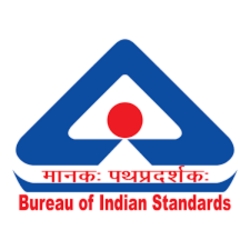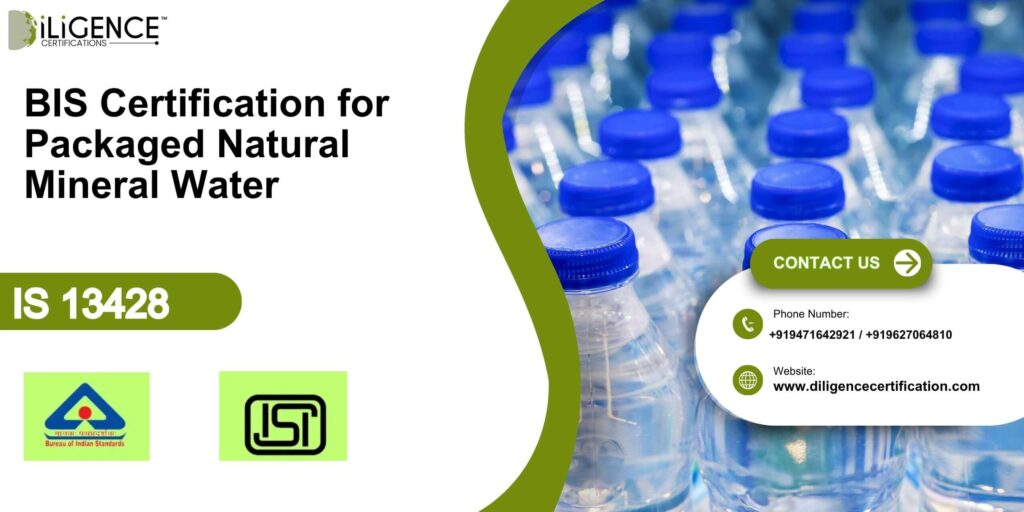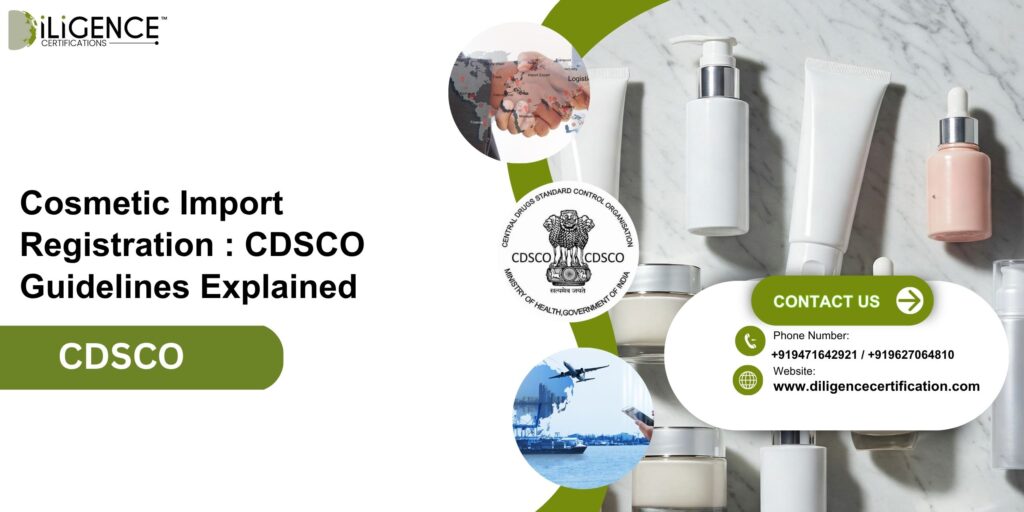- All packaged natural mineral water sold in India must meet this requirement by law.
- The quality is checked in the areas of the origin, mineral content, microbiology, packaging, and labeling.
- The certification process consists of a request, a factory audit, sample testing, and a license issuance.
- Typical problems that come up most often are source protection, traceability, laboratory calibration, and labeling mistakes.
- A business can benefit from such a certificate in the following ways – to gain the confidence of consumers, to enter the retail sector, and to get the help of the popularity of a brand.
Introduction
A mineral water company in Uttarakhand was thrown a curveball when one of its resellers declined a consignment of the brand. The water was pure and neatly packed, yet the absence of a BIS certification as per IS 13428 made the shipment a problem. Naturally, it is unlawful to sell mineral water in India without a standard certification. A certificate from BIS is given to companies that adhere to the safety, quality, and labeling standards set forth. The certification also provides the brand with customer loyalty and paves the way for the marketplace.
What is BIS Certification for Packaged Natural Mineral Water

BIS certification for packaged natural mineral water is a notice from the Bureau of Indian Standards (BIS) informing that a water product in complete accord with the safety, cleanliness, and labeling standards set by the country for extraction, processing, and sealing of water was tested. A brand that is selling naturally happening mineral water in India must obtain this certification.
Key Points:
- It refers to the method of IS 13428 as the Packaged Natural Mineral Water (PNMW) Specification (Third Revision) by the Bureau of Indian Standards (BIS).
- The compliance of chemical, microbial, and packaging standards is confirmed.
- The water is a sample that is natural and unpolluted, has been shipped, and tested to ensure that the mineral composition remains unchanged, as declared under the standard.
- The ISI mark given on the bottles is the most user-friendly and the easiest way to show the authentication of the product to the user.
- BIS Certification is the minimum legal mandatory for production as well as for the sale of packaged natural mineral water in India.
What is IS 13428?
IS 13428 is the term denoting the specification of a product referring to Indian standards that is used as a reference for Packaged Natural Mineral Water. The standard was prepared with the aim of defining requirements, methods of testing, and good practices in the handling of water so that the water could be safe, pure, and also be of the original mineral composition. Along with source protection, the standard also lays down in detail the technical and procedural requirements for every stage right from bottling, labeling to storage, and so on, thus ensuring that the product is delivered to consumers without any contamination or alteration.
Key Points:

- IS 13428 defines the standards of the Bureau of Indian Standards (BIS) for Packaged Natural Mineral Water in India.
- It outlines water quality requirements and various safety measures that need to be taken for water from natural sources.
- The water parameters include chemical compositions, microbiological limits, and packaging quality.
- On the other hand, bottling is carried out to retain the natural mineral content in the water.
- The BIS certification and ISI MARK can be obtained only by complying with the IS 13428 standards.
Who need BIS Certification for Packaged Natural Mineral Water
BIS Certification for Packaged Natural Mineral Water is a must-have for any manufacturer, bottler, or seller who plans to make and sell natural mineral water in India. Small, local, and regional brands are all required to meet IS 13428 standards if they are to sell water labeled as ‘natural mineral water’ legally. In the absence of this certification, the products cannot display the ISI mark or be legally distributed through retail or institutional channels.
Key Points:
- All manufacturers and bottlers of natural mineral water in India.
- Brands that are willing to sell or distribute bottled natural mineral water.
- Companies that are planning to enter retail, institutional, or export markets.
- Compliance is necessary irrespective of the size of the plant or the scale of production.
- It is mandatory to legally use the ISI mark on packaged natural mineral water.
Key features of BIS Certification
BIS certification for packaged natural mineral water as per IS 13428 is a guarantee that the product is free from harmful substances and meets the required standards of quality and hygiene. It is a certification that essentially sanctifies every step of production, from the encapsulation of the natural source to bottling, labeling, and storage. Besides, the certification is also a means of identification of the ISI mark, which is one of the requirements for the consumer to give their trust.
Key Points:
- BIS certification is the key to the door that opens to the standards of quality and safety as per IS 13428 to be achieved.
- The specifications cover the issues of source, processing, bottling, and packaging hygiene.
- The parameters of the product are dictated as chemical, microbiological, and physical to the extent that they must be within the required limits.
- Product labeling in terms of both accuracy and compliance is part of the mandate.
- The ISI mark can now be legally used for the purpose of marketability and thus is assigned a higher level of trustworthiness by the consumers.
- The BIS also engages in the performance of regular inspections to ensure that the standards are met.
Step by Step process of BIS Certification for Packaged Natural Mineral Water

Step 1: Pre-Audit Preparation
- For source protection, water quality and labeling, an internal audit must be conducted on plant facilities.
- If the quality control lab is properly equipped and the staff is adequately trained, then the audit will be successful.
- Make sure that hygiene is maintained and that the packaging materials have been verified.
Step 2: Application Submission
- Under BIS Scheme I, fill out the forms that are used to make an application.
- Document submission should accompany the application for permission as well as plant layout, water test reports, process/technical details, and labeling samples.
Step 3: Factory Audit & Inspection
- The BIS officials visit the manufacturing sites. They examine source integrity, production hygiene, lab facilities, and record-keeping.
- The time for making corrections regarding nonconformities, if there are any, is within a specified period.
Step 4: Sample Collection & Testing
- For the water samples, the plant or market is selected by the BIS from where the water is taken for testing.
- Microbiological, chemical, and physical parameters of the samples are tested at BIS-approved labs.
Step 5: Grant of License & ISI Mark Usage
- The Scheme I license of BIS is awarded when the audit and sample testing are found to be successful.
- The manufacturers of bottles can now display the ISI mark.
Step 6: Surveillance & Renewal
- BIS carries out their checking and selects samples from markets for testing at regular and unannounced intervals in order to ensure compliance always.
- According to BIS requirements, license renewal necessitates.
Timelines, Costs, Validity & Renewal
| Parameter | Details |
| Timelines | Domestic: 30–60 daysForeign: up to 180 days |
| Costs | BIS fees, lab testing, plant upgrades |
| Validity | 1 year |
| Renewal | Re-audit with sample testing; continuous BIS surveillance |
Why choose Diligence Certification
- Professional support in meeting the BIS IS 13428 specifications.
- Pre-audit evaluation to pinpoint and rectify the issues of noncompliance.
- Help with the preparation of documents, lab reports, and submission of the license.
- Minimises waiting time and achieves first-time clearance of the application.
- Multiple brands and territories are among the clients who benefit from our reliable track record.
Conclusion
BIS Certification for Packaged Natural Mineral Water under IS 13428 is the foremost step to be taken by the manufacturers to ensure that their product is legally compliant, trusted by consumers, and accepted in the market in India. The proper procedure (starting from pre-audit readiness, factory visit, sample testing to issuance of license) acts as the guarantee of safety and quality standards for the product. This certification not only permits the usage of the ISI mark but also is a seal of the brand’s credibility, shelf visibility, and business growth in the long run.
Frequently Ask Questions
What Is BIS Certification for Packaged Natural Mineral Water?
BIS, Bureau of Indian Standards (BIS), grants a Product Certification mark as per IS 13428 is a standard that calls for a product to be of safety, quality, and labeling standards.
Who Needs BIS Certification?
First of all, the carriers or bottlers of Packaged Natural Mineral Water who are the manufacturers. Next, sellers both in the organized and unorganized segment of packed natural mineral water in India will be the ones to obtain this certificate.
What is IS 13428?
IS 13428 is the Indian Standard that defines the requirements in the water origin and safety of the source, and protection of natural water by specifying its mineral composition, treatment, packing, and labeling.
Is BIS Certification Mandatory?
Yes, it is a legal requirement for any product that is manufactured, sold, or distributed as packaged natural mineral water in India.
What are the Main Features of the BIS Certification?
These are the most significant ones; it includes the safety and quality standards compliance, protection of the source, proper processing, accurate labeling, usage of ISI marked and continuous surveillance.
What is the step-by-step process for Certification?
Pre- audit preparation → Application submission → Factory audit → Sample collection and testing → License grant → Surveillance and renewal.
How Long Does the Certification Process Take?
In the case of domestic manufacturers, the period is from 30 to 60 days; on the other hand, for foreign manufacturers, it is 180 days.
What is the Validity of the BIS License?
It is one year.
How is the License Renewed?
The renewal process includes all the activities such as the re-audit, sample testing, and the continuation of the BIS surveillance under which the compliance.
Why Choose Diligence Certification?
They walk you through in the detailed step-by-step manner, they manage your pre-audit needs, provide you the documentation assistance, shorten your waiting time, and make sure that your first time approval as well as the subsequent ones come smoothly.








 BIS Certification
BIS Certification
 CDSCO
CDSCO
 CPCB
CPCB
 LMPC
LMPC
 WPC Approval
WPC Approval
 Global Approvals
Global Approvals
 TEC
TEC
 ARAI
ARAI
 BEE
BEE
 ISO Certification
ISO Certification
 Drone Registration
Drone Registration
 NOC For Steel
NOC For Steel



















 Business Registration
Business Registration















 Legal Services
Legal Services
 Trademark Registration
Trademark Registration
 Copyright Registration
Copyright Registration
 Patent Registration
Patent Registration
















































